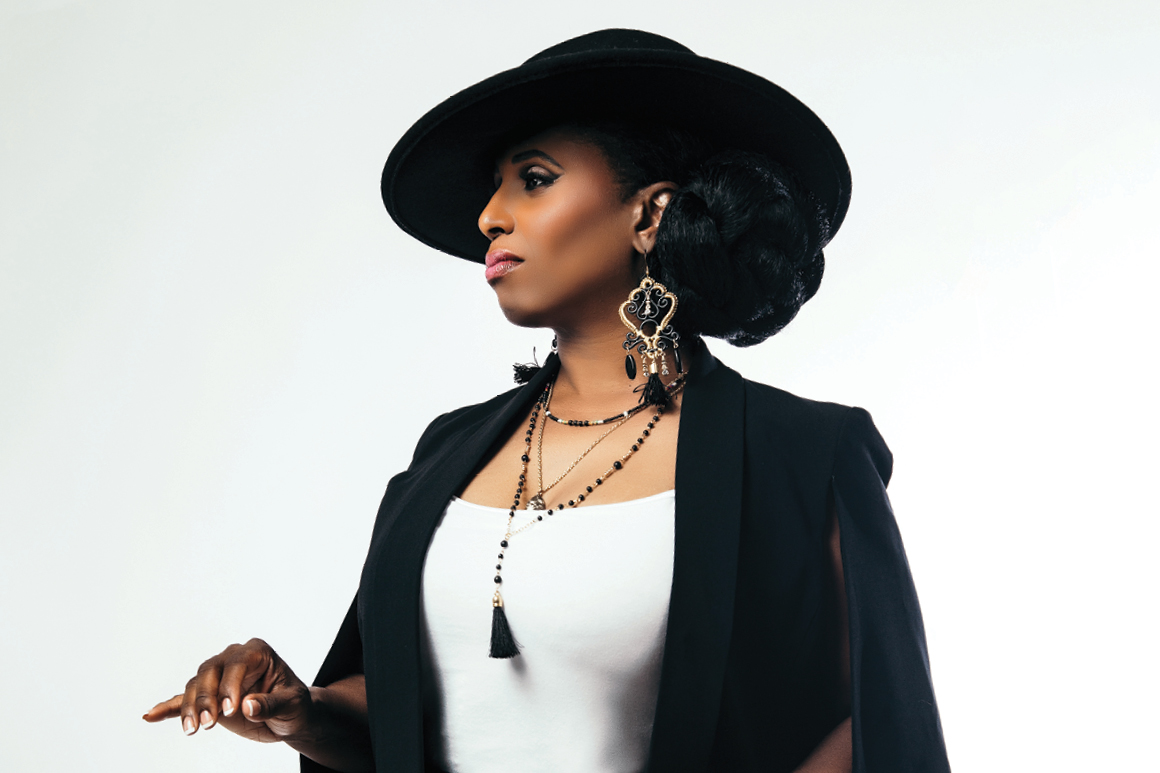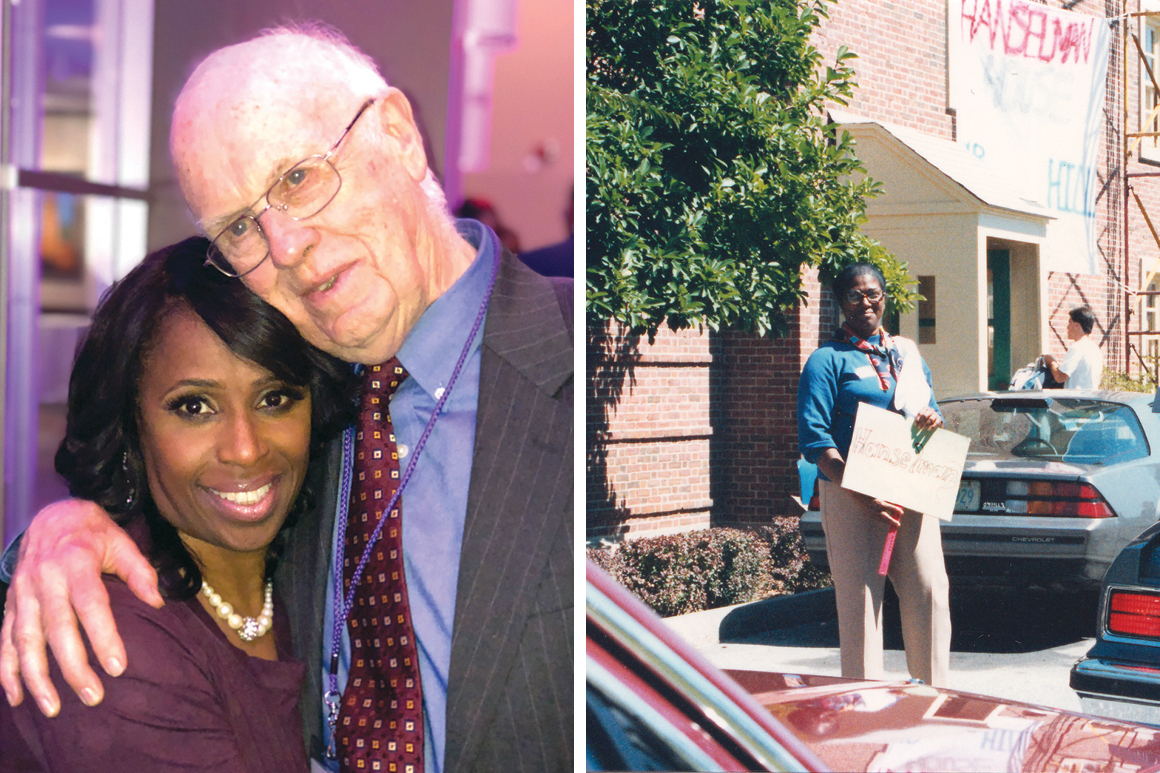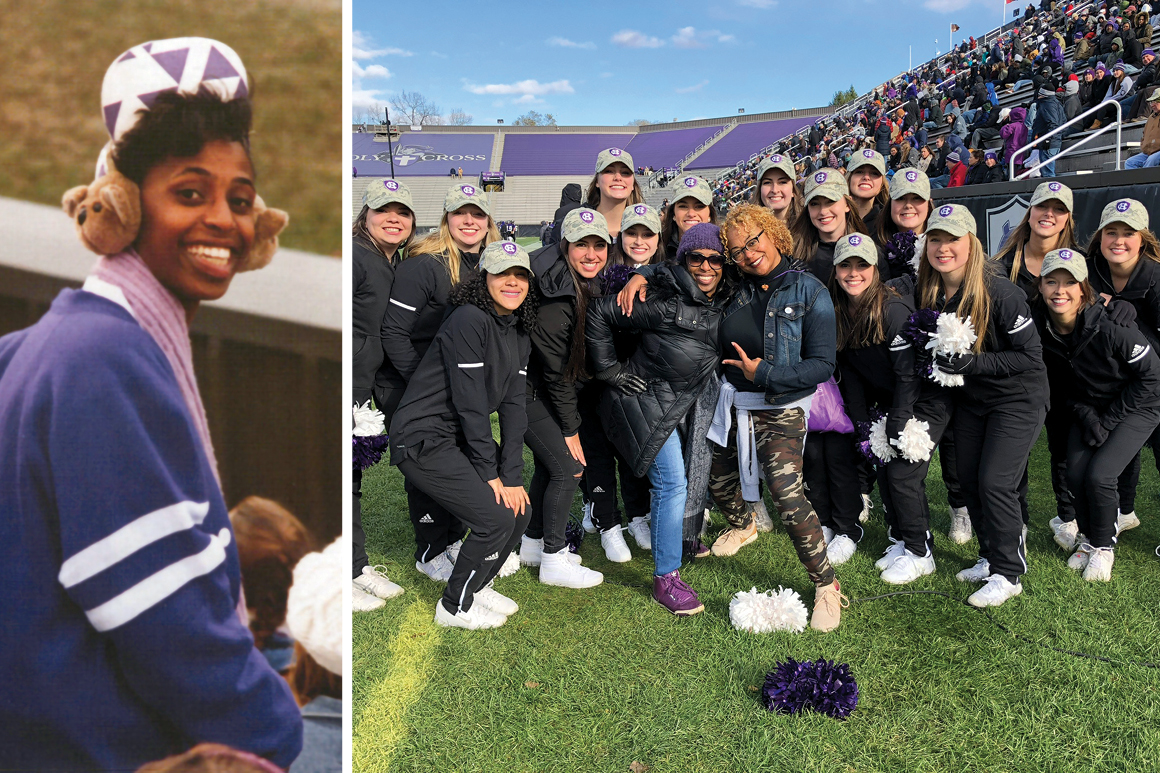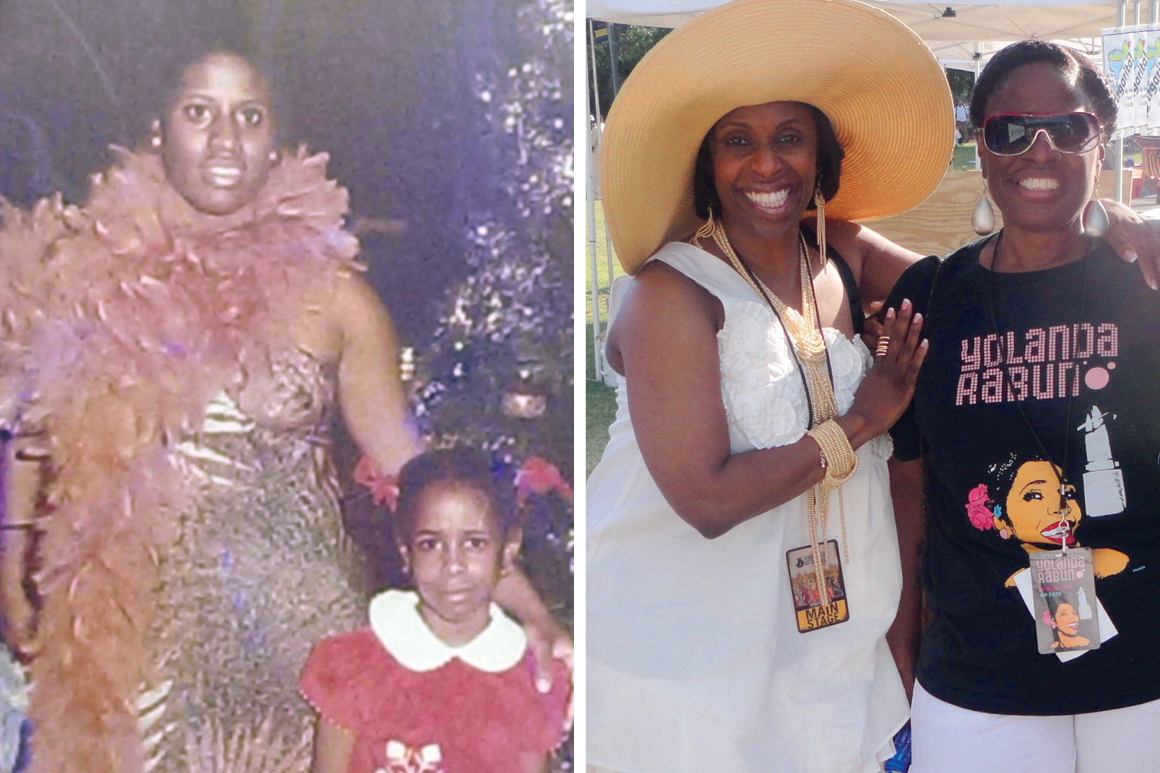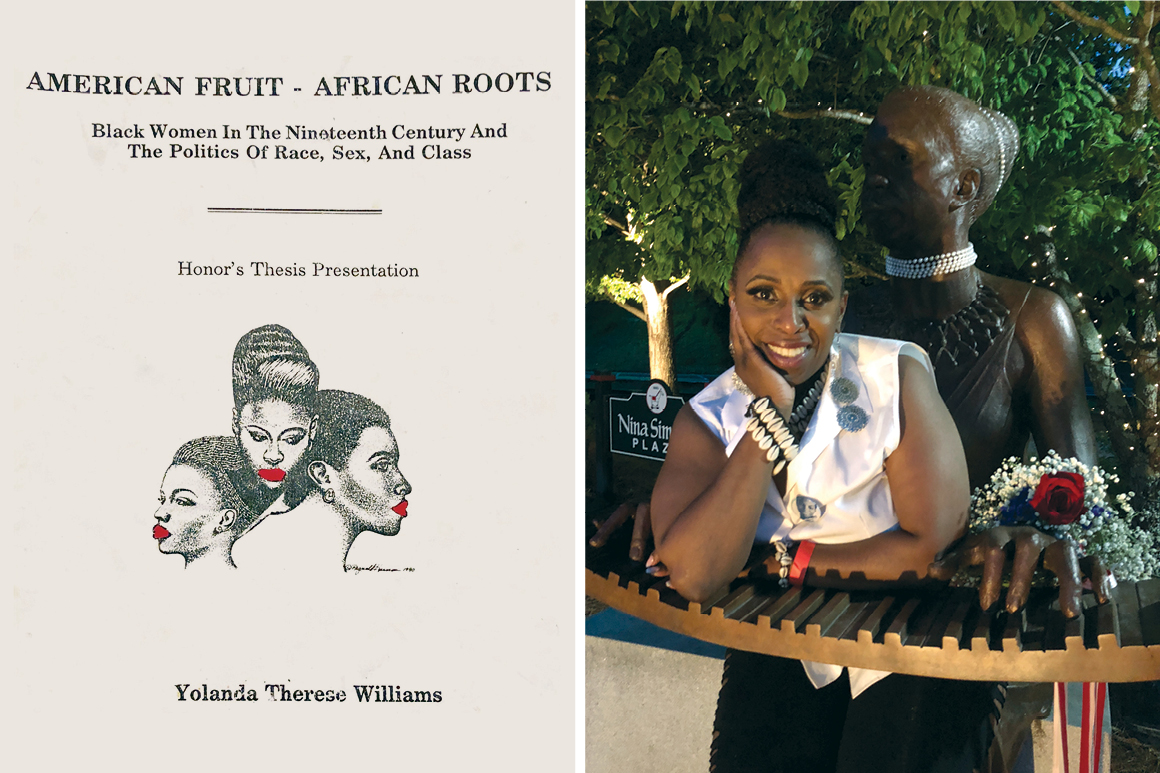It was the first football game of the 1986 season, Holy Cross versus Lehigh — a season that would culminate in a Patriot League championship for the Crusaders.
The September day was warm and sunny as Yolanda Williams '90 strode onto Fitton Field, alone, downfield and clearly apart from the Holy Cross cheerleading squad. And with all she had in her 5-foot frame, she began to cheer.
The 17-year-old freshman had not made the team, but her tryout impressed the cheerleading coach's husband, who talked his wife into making her an alternate, allowing Williams to practice with the team. But alternates didn't cheer at games.
"It was mind-blowing to me that I didn't make the team," recalls Rabun (née Williams). "I came in with a wealth of experience and technique; I was, like, a professional cheerleader. I felt like my tryout was amazing with all the somersaults I did. And the herkies. And the splits."
A few days before that first game, though, the cheerleading coach said Rabun could cheer— unofficially—away from the rest of the squad.
"When I learned I hadn't made the team, I called my mother and she said, 'You go out there and be you.' And that day, there I was — way off to the side and not one of them," she recalls. "And I went out in that game and cheered like there was no tomorrow. And the crowd, students mostly, became my cheerleader, and it was great.
"After that, the coach said, 'I’m putting you on the squad,' she continues. "And I know I made the squad because of the fans and the students — Black and white — who said I should be on the team. And I think the lesson is: People can let go of their perceptions of what the world is supposed to be like, the status quo and such, and let people be themselves. That was a life lesson for me: Sometimes you have to be quiet, but keep being you and the universe will choose what’s right. People will yield to give you what's always going to be yours."
By her senior year, Rabun was the squad's first Black co-captain in Holy Cross cheerleading history, and she'd developed a reputation for being a trailblazer in other areas, as well. Several decades later, it's still her signature. Look up Yolanda Rabun on LinkedIn and you'll see her name trailed by a list of titles almost as long as a royal's: senior counsel, IBM manager and executive, speaker, wife and mom, actor, recording artist and producer. At the very end is the phrase "Not done."
First, though: After graduating with honors and a degree in political science from Holy Cross, Rabun earned a J.D. at Boston College Law School, where she was a presidential scholar, a designation given to students awarded full scholarships. Rabun is now senior corporate counsel at IBM in North Carolina. And among other volunteer pursuits, serves enthusiastically as a volunteer teacher for the nonprofit organization Black Girls CODE, which educates young girls of color on programming and emerging technologies. And a coach and mentor to women at IBM and in Holy Cross' Women In Business program. And a professional speaker. And a professional actor.
She's also an internationally known recording artist who has opened for the Isley Brothers, Sheila E, and KEM, as well as headlined at nationally known venues such as Washington D.C.'s Blues Alley Jazz Club, Atlanta's The Velvet Note, and the Catalina Bar and Grill in Los Angeles.
And the genesis of this multihyphenate life? In great part, it was her Holy Cross experience, Rabun says: "It was the place where I found myself. It was where I started to develop who Yolanda Rabun was to be in life, which is ultimately a good servant." At graduation, Rabun was the recipient of the distinguished Presidential Service Award, which honors seniors who have, to an exceptional degree, used their time, talents and resources in service to the College, their fellow students and the community.
"I don't wear brown"
So, how did a Georgia-raised girl from a family of United Methodist preachers learn of Holy Cross? Well, first know that purple is Yolanda Rabun's favorite color. So she was drawn to the school's colors when she first encountered them at a college fair. Her college choice came down to Brown University or Holy Cross. "I don’t wear brown," Rabun laughs.
Hailing from a long line of Christian ministers, Rabun felt Holy Cross was a good enough fit. "I remember thinking that I'd go to Holy Cross and become a preacher or a minister eventually," she says. "I actually learned at Holy Cross, though, that my pulpit could be to basically use the gifts God gave me, to use them in every fashion and form, to bring people to the light—whatever that means for them."
Rabun credits the late Ogretta V. McNeil, associate professor of psychology and assistant dean for academic services for ALANA (African American, Latin American, Asian American or Native American heritage) students, and B. Eugene McCarthy, professor of English and one of the founders of the African American Studies Program, with some of her most important lessons. Both encouraged her to advocate for herself.
"Ogretta was like a second mother, a guardian, to me," Rabun recalls. McNeil met with and addressed the new students of color the first weekend they arrived at Holy Cross, Rabun says: "And she made it very clear to me and to many of my friends that she was there to help us succeed and to not be deterred by little things that could happen."
What little things?
"I remember I took a class and the professor gave me a 'D' on a paper — the first 'D' of my life," Rabun recalls. "I went to Ogretta's office and she read the paper and said, 'Withdraw from this class. This is not a 'D' paper.' And that was probably the best advice I could've gotten because, I think, honestly, I might've been scarred for life had I stayed in that class. I was telling this story on a call with Holy Cross students to say to them that if you get a bad grade freshman year, don’t freak out or get discouraged. Get advice. If I'd continued in that class, the professor's actions could've ruined my outlook at Holy Cross."
Instead, Rabun heard the wisdom in McNeil's advice and realized that to withdraw was a statement of strength, a refusal to be the victim of an injustice. "Again, sometimes the bravest thing you can do is to let go," Rabun says.
"He just said, 'Be you.' And that's what I did"
And there was so much other work to be done: Rabun was on the dean’s list. She was the College’s first Black head RA, vice president of the Black Student Union and a work-study student, first in Kimball and then in the AV Department. She deejayed on WCHC 88.1 and sang and danced in theatre department musicals. She was a senior admissions interviewer, on the college debate team and regularly performed in The Pub and Lower Kimball. But, perhaps, Rabun's greatest performance was her senior thesis project.
Though Rabun was a political science major, McCarthy, an English professor (now emeritus), became her advisor on her senior thesis, "American Fruit — African Roots: Black Women in the 19th Century and the Politics of Race, Sex and Class." It was not only a traditional scholarly paper, but also a creative act: a theatrical performance. "Professor McCarthy was a blessing to me; the man who told me that the world was mine to create in and to exist in and to not be ashamed, afraid or inhibited by," she remembers. "He just said, 'Be you.' And that’s what I did."
That advice became reality in the form of a play Rabun wrote to serve as her public presentation of her Honors thesis about 19th-century Black female revolutionary figures: Harriet Tubman, Sojourner Truth, Ida B. Wells and Anna Julia Cooper, among others. The arc of the piece was how the women had fought against oppression and fought for their race, womanhood and rights as citizens. Her 1990 thesis production had such an impact, she returned in 1993 at the request of the College’s Women’s Weekend planning committee to give a repeat performance, for which McCarthy still has the program. "In retirement, you get rid of the greatest number of things you can," he notes, "“but one of the things I’ve kept is her performance program. I have it here in front of me: March 27, 1993, Fenwick Chapel. It just struck me as something I needed to keep."
McCarthy, who taught Black literature at Holy Cross for many years, was an enthusiastic supporter of her work. "He might've been the key to my being able to present my thesis in the way I did," Rabun says. "I learned at Holy Cross to be open to everything and attached to nothing, so I didn't approach my thesis with this fixed, preconceived idea that it had to be only a thesis paper and presented in a certain way. Professor McCarthy encouraged me to explore the possibilities of writing the thesis and being creative about how I shared it publicly for completion of the Honors Program. He said, it's up to me to be the best that I could be; so I turned in a paper and a play."
"She created this choreo-poem. That's what she called it," he says. "She not only researched all of these women, but then created this program beginning with the African queens and moving through history into African American women’s activities in the 19th century, early movers in civil rights, women’s rights, anti-lynching laws — women who were writers and activists. I think I probably kept the program because what she did was so unusual, distinctive and thoroughly impressive. Normally a student has good ideas and presents something, but this took a lot of daring and an enormous amount of confidence. This was not just simply sitting in the library and working out an essay. This was also acting, music, staging and costuming."
The work was daring for another reason, too. Rabun told the audience assembled that she would be presenting difficult history threaded with themes of enslavement, lynching, rape and racial exploitation. "That would’ve been, maybe, a bit hard for an audience who wasn't ready to hear that," McCarthy says.
"I remember saying as I made the presentation of the choreo-poem based on my thesis paper that I was unapologetic about being so open and serious about a topic related to Black Women," Rabun recalls. "I said it was something we should all talk about and that I hoped the faculty understood that this is our history and that Holy Cross can make a difference going forward."
Tanya Baskin '91 played Harriet Tubman in the 1990 production. "It was amazing," she says, smiling at the memory. "I'd never been in a play or a theater or anything, and she whipped us into shape like nobody's business. And we were pulling for her. We were, first of all, excited to be there, and then here was this play that she had written. I don't think we understood the enormity of it, understood the work that goes into something like that. For one person to do all of that was amazing.
"And of course we weren't going to let her down," Baskin continues. "So we tried our best to deliver what her vision was. And I think we did. And she got Willie Bradford '90, the most brilliant guy, an economics major and a football player at Holy Cross — a very serious guy — to show up and perform."
That would be Holy Cross football co-captain Willie Bradford, who in 1990 led Holy Cross to its fourth championship in the first five years of the then newly formed Patriot League.
"That's the kind of effect Yolanda had on people," Baskin says of Bradford’s casting. "She could flow in and out of all the groups and get people to participate in this and support her in that. I don't know of any other honors student who staged a production rather than presented a paper to a panel. But people believed in her. We knew and felt and believed in her."
What Rabun received, she gave back, notes Andrea Jordan '92. Rabun was Jordan’s first RA. "She's such a playful child at heart, but at the same time so vastly intelligent, and she just embodies this spirit—of life, of energy—that won't be ignored or denied," Jordan says. "When she was my RA, she was clearly trying to help me find my place."
Rabun shared her cheerleading experience with Jordan, a high school basketball player, who says it inspired her to try out for the women's basketball team. Jordan played for Holy Cross her sophomore, junior and senior years.
"I remember Yolanda said to me, 'You're going to get in where you fit in. You'll find your niche,'" Jordan recalls. "I think that’s a testament to her having been my RA and kind of my inauguration into Holy Cross campus life. She had the ability to just plant those seeds of inspiration and hope that resonated with you because of being a witness to how she lived."
"We lift as we climb"
It might be surprising to learn that the big personality that is Yolanda Rabun is contained within a small package. "We went to see her perform at Blues Alley, and she starts her concert from the top of a staircase and the music starts going and the lights are on and she comes down like a Rockette, throwing her legs up in this silver sequined ensemble that had a split up to mid-thigh," Jordan recalls. "This tiny little thing singing like Billie Holiday, and I'm looking at the audience and laughing hysterically because they're not ready for her. They have no idea. And then, all of a sudden, she has them and they're like, 'Yeah! Why don't we know about her? Why is this her first time here?"
It’s a common reaction, says Michaile Rainey '91: "Yody was always performing, always singing. If she wasn't performing in The Pub, she was singing in the hallway or in the car. When we'd perform together for our BSU activities, she could command the audience. She has that level of stage presence, that level of understanding how to feel a room and give them what they’re looking for."
Rabun was an audience favorite at the 2020 edition of Holy Cross' annual Women in Business conference. The pandemic forced the event online and attracted the largest alumni audience to date, 400, plus 100 students. Cassie Gevry, associate director of the Ciocca Center for Business, Ethics, and Society, says Rabun's example exemplifies the path she would have students envision for themselves. "She's a real role model, a woman who has taken her liberal arts education and found her own path—and that's an excellent example for our students when we are suggesting that they can major in anything and succeed in business," Gevry says. "And Yolanda's a men-and-women-for others person—turning around and offering her hand to fellow alumni and students, giving them opportunities, potentially, at IBM."
Monica Polanco Fabian '16 received a message from Rabun after attending the conference. Rabun noted that they lived relatively close to each other and she knew Fabian was interested in tech. She asked Fabian if she could be of help. "And I got so excited because here was another woman of color, living in North Carolina, working for a tech company, and we just clicked," Fabian says. "I remember, she said this thing to me, 'We lift as we climb.'"
Fabian now works for IBM as a software developer. "You know, when you think of a Holy Cross alum who really captures the true essence of what a Holy Cross Crusader is, I think of people like her," she says. "And I think it says a lot about women, and women of color, that we are multifaceted and we can do everything. She's an amazing example of that."
"OK, I’m doing both"
In addition to all else, Rabun is excited to be back performing her one-woman show on the life and music of singer, songwriter and human rights activist Nina Simone. Rabun's musical métier actually predates her law career by more than a decade. She first began touring internationally as a vocalist at the age of 14, as a student at Northside High School of the Performing Arts in Atlanta. There she and her classmates performed for then-First Lady Nancy Reagan, who was so impressed she said to one of the school's administrators, "Either this show is coming to the White House or the president is coming to you," according to one newspaper account. A second visit to the school was scheduled and Rabun, then a junior, sang a solo gospel version of "God Bless America," composed by Oscar- and Grammy winner Isaac Hayes specifically for the event. For her effort, Rabun received a standing ovation, a kiss from the President and something of a commandment from Hayes.
"So I met Isaac Hayes and worked with him and he kept saying, 'I know that you're smart and you want to be a lawyer, but you’re going to sing.' And I was like, 'Yeah, OK, I'm doing both.' And he said, 'Well, then, you gotta be a singing lawyer.'"
Rabun laughs at the memory. "It was a joke, but I would become a singing lawyer because I was not going to give up what I was doing in the arts. And I haven't."
Two of the greatest fears people cite in life are of speaking in public and of failure. Since those clearly don’t inhibit her, what, then, does Yolanda Rabun fear?
"What scares me is the idea that people won't get it before they die. They won't understand what it, this life thing, is about, which is the opportunity to really live," she says.
Asked what the future holds for her, Rabun says she has at least two books in her future. She also has interest in being a law school professor and a certified genealogist. Don't hold her to just that, though. "Every day, life reveals something new for me to learn," Rabun says. "It’s affirmation, and I think: Oh, I am not done."
Written by Marybeth Reilly-McGreen '89 for the Summer 2021 issue of Holy Cross Magazine.
About Holy Cross Magazine
Holy Cross Magazine (HCM) is the quarterly alumni publication of the College of the Holy Cross. The award-winning publication is mailed to alumni and friends of the College and includes intriguing profiles, make-you-think features, alumni news, exclusive photos and more. Visit magazine.holycross.edu/about to contact HCM, submit alumni class notes, milestones, or letters to the editor.
